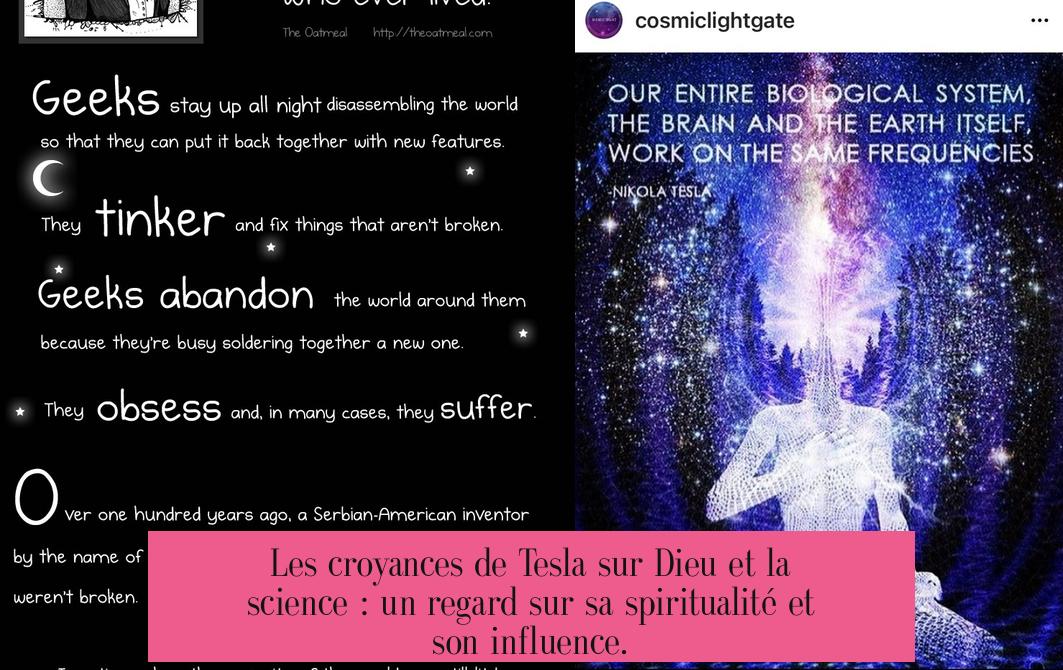Did Tesla Believe in God?
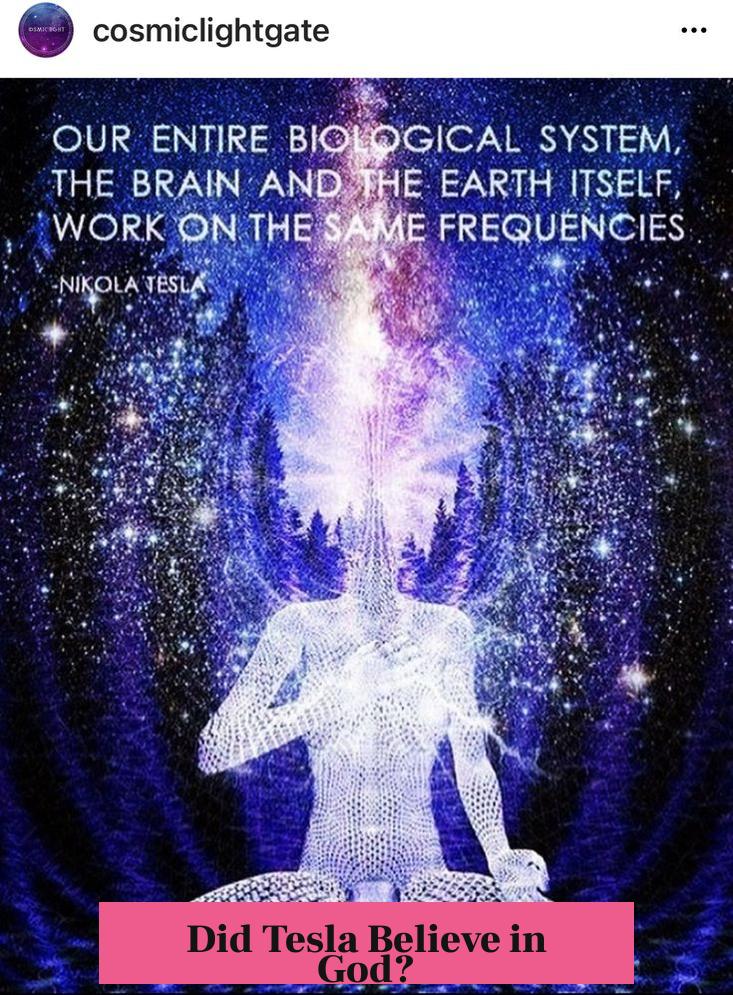
Nikola Tesla’s belief in God is complex and nuanced. He was deeply religious in a personal sense but rejected orthodox Christianity. Tesla viewed God as a universal creative energy permeating the universe rather than an all-powerful deity.
Religious Background and Family Influence
Nikola Tesla was born in 1856 into a Serbian Orthodox Christian family. His father was an Orthodox priest, and his family was devout. Tesla’s upbringing included religious traditions such as celebrating his Slava (patron saint day) and engaging with Biblical texts during illness.
His father desired Tesla to become a priest, but Tesla followed a different path. Despite distancing himself from formal religion, some Orthodox teachings influenced Tesla’s early views, particularly the idea that natural laws reveal divine principles.
Tesla’s Personal Beliefs About God
Tesla described himself as “deeply religious,” but not in the traditional orthodox sense. He rejected the Christian concept of an all-powerful God and instead believed the universe operates like a grand machine. He often referred to a “creative principle” alive in every atom.
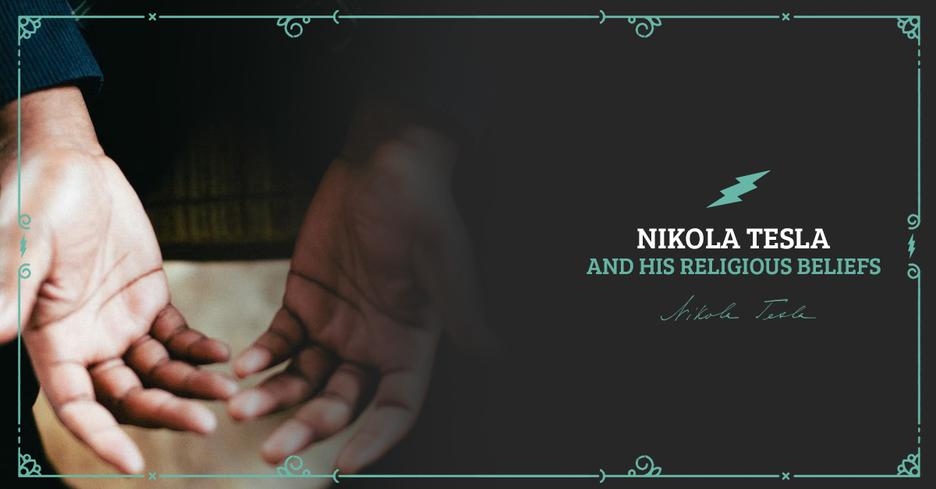
He saw God as an impersonal universal force governing all existence. This belief combined spirituality with a scientific understanding of the cosmos. Tesla viewed divine truth as accessible through scientific inquiry and exploration of non-physical phenomena.
God as Energy and Universal Force
Central to Tesla’s views was the idea that God is energy. His pioneering work in electrical engineering shaped this conception. Tesla believed energy was the fundamental force that connects all living beings and drives the universe.
For Tesla, harnessing this universal energy could unlock humanity’s potential. He rejected traditional religious narratives about God as a separate entity, presenting God as an all-encompassing life force present in every aspect of creation.
Integration of Science and Spirituality
Tesla saw science and religion as complementary rather than opposing domains. Science offered a logical framework for understanding physical reality. Religion provided emotional and intuitive pathways to seek meaning.
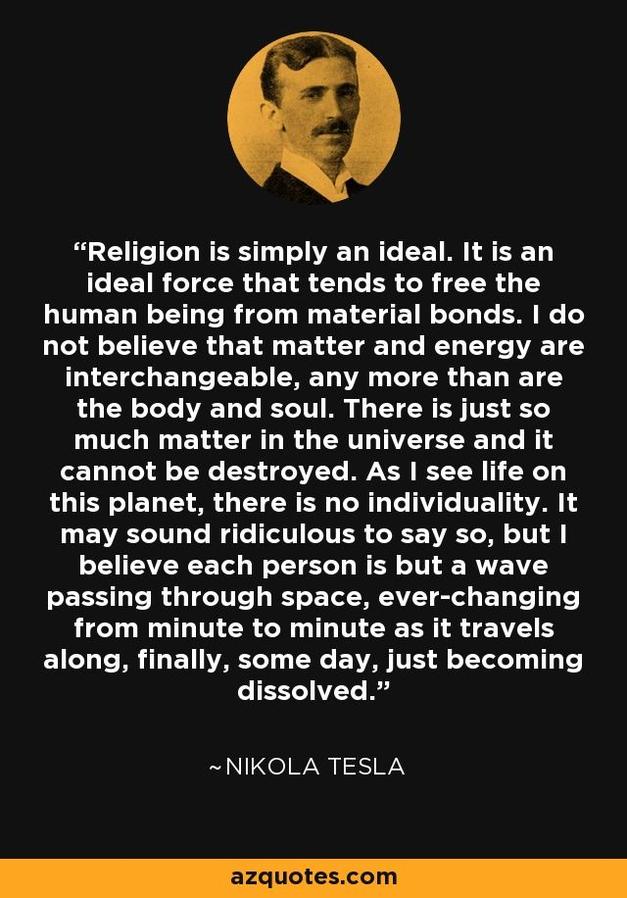
He criticized dogmatic religion for hindering progress but embraced spiritual exploration as essential. Tesla believed personal spiritual growth, combined with scientific knowledge, would lead humanity toward enlightenment.
Influence of Ancient Philosophy
Tesla referenced concepts from ancient Indian philosophy, including terminology from Sanskrit texts like the Vedas. This influence aligned with his belief in a universal creative principle found across cultures and religions.
These ideas informed his holistic view of the cosmos, linking ancient spiritual wisdom with modern scientific discovery.
View on Humanity and the Universe
Tesla emphasized the potential of the human mind to access infinite universal wisdom if aligned with the divine energy. He believed universal enlightenment and compassion were keys to overcoming conflict and fostering peace.
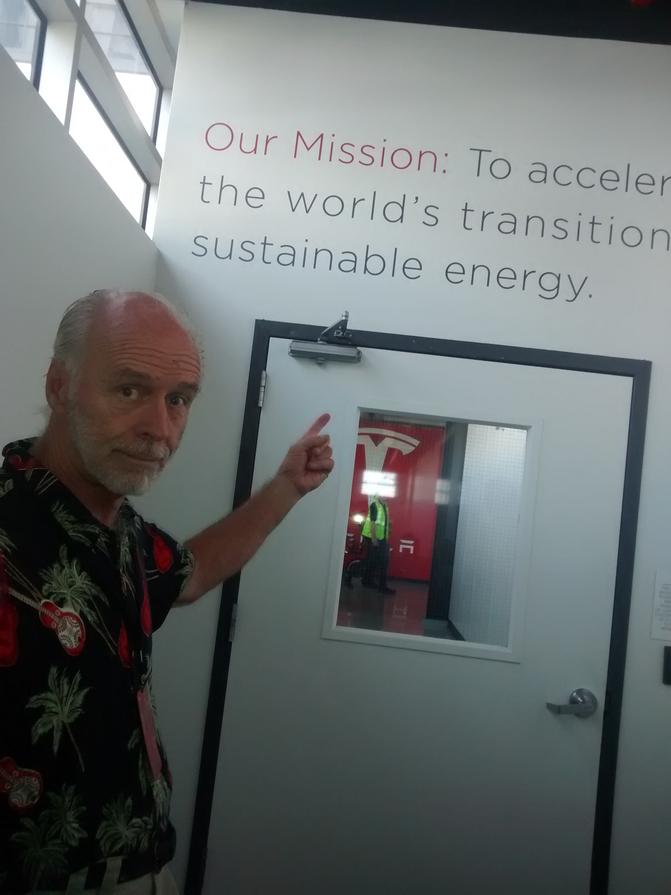
He often spoke about transcending egoism and living harmoniously in unity with the creative principles of the universe.
Public Perception and Misconceptions
Many label Tesla an atheist due to his rejection of orthodox Christianity and his strong commitment to the scientific method. Yet Tesla never denied spirituality or a higher creative power.
His beliefs defy clear classification; he maintained faith in a universal, impersonal divine energy rather than a traditional God figure.
Key Quotes Reflecting Tesla’s Belief
- “The gift of mental power comes from God, Divine Being, and if we concentrate our minds on that truth, we become in tune with this great power.”
- “To me, the universe is simply a great machine which never came into being and never will end.”
- “The creative principle is alive in every atom and manifests itself in everything that exists.”
- “It might as well be said that God has properties. He has not, but only attributes and these are of our own making.”
Summary of Tesla’s Belief in God
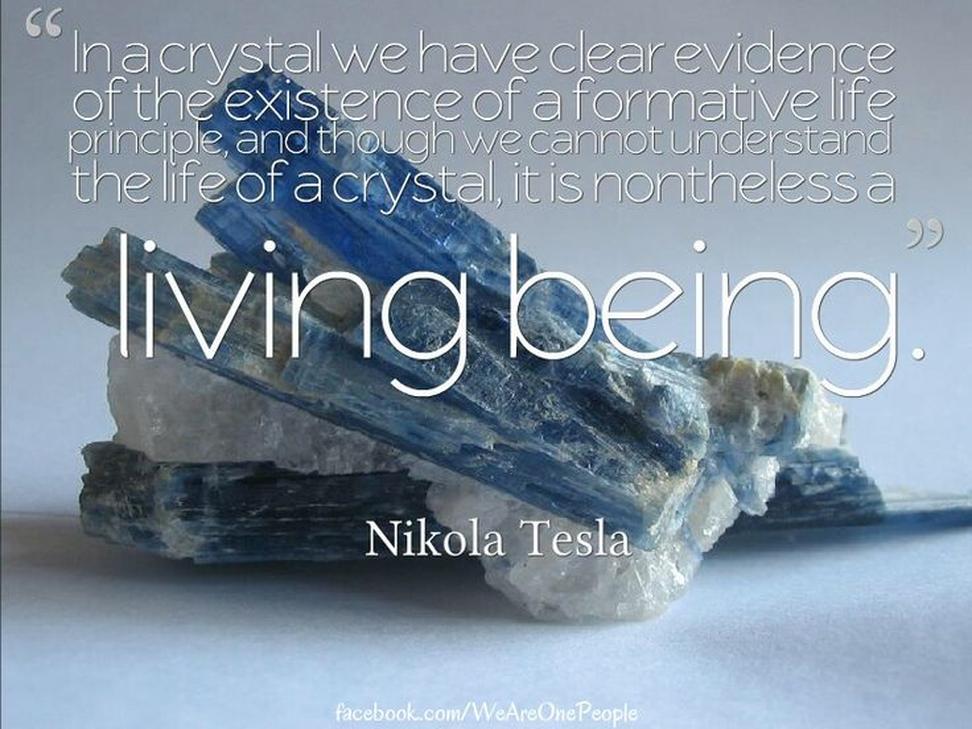
- Tesla was raised in Orthodox Christianity but developed a unique personal spirituality.
- He saw God as a universal creative energy, not a personal deity.
- God and the universe operate as an interconnected mechanical system.
- Tesla combined scientific inquiry with spiritual exploration.
- He believed science would uncover deeper divine truths.
- His faith emphasized harmony, love, and human potential.
Did Tesla Believe in God? Unpacking the Spirituality of a Scientific Genius
Did Nikola Tesla believe in God? The short answer is: Yes, but not in any orthodox or traditional sense. The inventor behind many revolutionary technological advances grew up in a deeply religious environment, yet his own beliefs evolved into a unique and nuanced spirituality. Let’s dive into the fascinating blend of science, mysticism, and philosophical inquiry that defined Tesla’s approach to divinity.
The Roots: Tesla’s Religious Upbringing
Nikola Tesla was born on July 10, 1856, in Smiljan, a village in modern-day Croatia, into a Serbian Orthodox family. His father, Milutin Tesla, was an Orthodox priest, deeply embedded in the church, with an uncle who rose to the rank of Archbishop of Sarajevo. Growing up in this environment, young Tesla was no stranger to religious rituals and teachings.
The family was quite devout. Tesla even observed the Slava, a Serbian custom honoring a family’s patron saint. His father wanted Tesla to follow the priesthood path, particularly during Tesla’s childhood illness with cholera when he was encouraged to read the Bible. These early influences planted seeds of spirituality, yet Tesla’s later beliefs would stretch far beyond strictly religious doctrine.
Tesla’s Personal Spiritual Philosophy
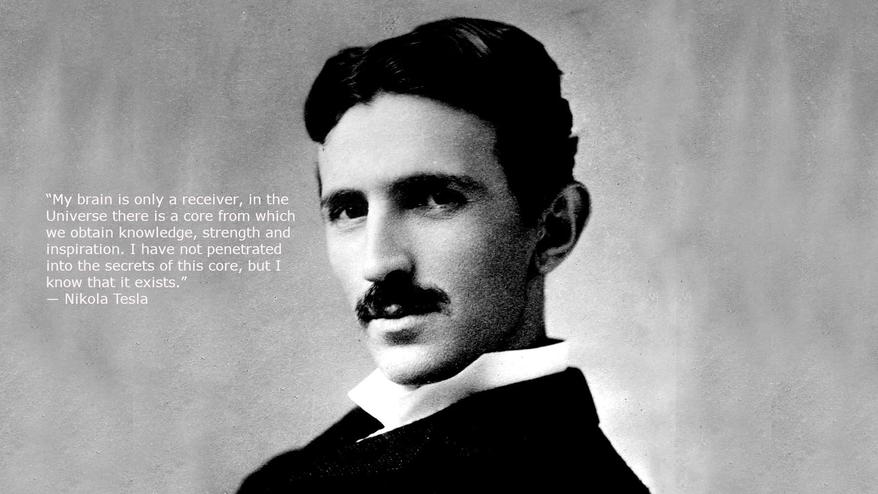
When asked directly if he believed in God, Tesla’s answer was revealing: “In my heart I am deeply religious, though not in the orthodox sense of that word.” He eschewed traditional Christian conceptions of an all-powerful, anthropomorphic deity. Instead, Tesla’s idea of God aligned more with a cosmic creative force—a universal energy powering everything.
Tesla viewed the universe as a huge machine, kinetic and eternal: “To me, the universe is simply a great machine which never came into being and never will end.” This machine was filled with energy, permeated by what he called a “creative principle.” It was less about dogma and more about uncovering the mystery through science and intuition.
The Cat, the Tail, and the Nature of Divinity
One of Tesla’s most charming and insightful anecdotes involves the family tom-cat when he was just three years old. Pulling the cat’s tail made the fur seem to light up like an electrical current. This childhood moment sparked Tesla’s lifelong fascination with electricity, but also with a profound question: “Is nature one large cat? If it is, who is pulling her by the tail? It can only be God,” Tesla mused.
His ability for detailed visual memory and deep reflection led him to interpret natural phenomena through a spiritual lens. He imagined God not as a distant figure but as an intrinsic force animating all existence. This blend of science and spirituality framed much of his work and worldview.
Ancient Philosophy’s Hidden Influence
Few people know Tesla incorporated ancient Sanskrit terminology and Vedic philosophy into his understanding of matter and energy. The Vedas, ancient Indian scriptures, discuss the atomic structure and cosmic energies—concepts Tesla admired and quietly wove into his interpretations.
This fascination with the ancient East added a mystical dimension to Tesla’s scientific investigations. He wasn’t merely an inventor; he saw himself as continuing a long lineage of thinkers striving to unravel the universe’s divine code.
Science and Spirituality: Two Sides of the Same Coin for Tesla
Tesla believed science and religion weren’t conflicting paths but complementary methods for uncovering truth. Science dealt with the physical and rational, while religion approached meaning and mystery emotionally and intuitively. Tesla’s vision was a fusion of both.
He worked closely with Walter Russell, a polymath who shared similar views. Together, they planned to lock away some of their revolutionary discoveries for 1,000 years, fearing humanity wasn’t yet ready for such knowledge. Tesla told his peers, “Today is your day, my day is still coming. I am an inventor of the future.”
Quotes That Illuminate Tesla’s Spiritual Outlook
“The gift of mental power comes from God, Divine Being, and if we concentrate our minds on that truth, we become in tune with this great power.”
“The day science begins to study non-physical phenomena, it will make more progress in one decade than in all the previous centuries of its existence.”
“It might as well be said that God has properties. He has not, but only attributes and these are of our own making.”
These quotes reveal Tesla’s understanding of God as an impersonal, intangible force rather than a personal deity with human-like properties.
God as Energy: Tesla’s Innovative Take
Tesla’s groundbreaking work in electrical engineering paralleled his spiritual concept of God as pure energy. He proposed that this energy was what infused all things, tying together the fabric of existence in a unified whole.
This view made Tesla’s spirituality inherently scientific. God was the fundamental force that drove the cosmos, accessible not through prayer alone but through the study, measurement, and harnessing of energy and natural laws. For Tesla, divine energy was universal and not restricted to any culture or religion.
Navigating Religion, Skepticism, and Spiritual Exploration
Though Tesla was deeply spiritual, he was also a staunch defender of the scientific method and occasionally expressed skepticism toward organized religion’s dogmas. Many people mistakenly labeled him an atheist due to his criticism of traditional religious constructs.
Yet, Tesla never denied the existence of a higher power. Instead, he reinterpreted spirituality in a way that harmonized with his scientific discoveries. He found fault with rigid religious institutions that suppressed free thought but encouraged individual spiritual exploration.
Tesla’s Vision for Humanity and the Universe
Tesla believed in the enormous potential of the human mind to connect with the infinite cosmic wisdom when attuned to the divine energy. Knowledge of nature’s laws could propel humanity to greater achievements and a peaceful coexistence.
He famously said, “What we now want is closer contact and better understanding between individuals and communities all over the earth,” emphasizing the elimination of ego and pride as key to preventing conflict.
His idealism merged morality, science, and spirituality, envisioning a world where love and kindness govern our actions, bringing us closer to the divine order of the universe.
Common Misconceptions About Tesla’s Beliefs
It’s easy to misunderstand Tesla’s views as atheistic because he rejected conventional religious doctrines and criticized supernatural claims not backed by science. Yet, Tesla’s belief system was more sophisticated. He balanced skepticism with deep spirituality.
His acceptance of a “creative principle” and his references to divine power show that he neither fully rejected nor blindly accepted religious teachings. Instead, he forged a personal philosophy where science and spirit coexist and enrich each other.
In Summary: Tesla’s Belief in God
- Rooted in tradition: Tesla was born into a devout Orthodox Christian family, which shaped his early understanding of spirituality.
- Deeply spiritual but non-orthodox: He rejected rigid religious dogmas but maintained a profound belief in a universal creative force.
- God as energy: Tesla’s God was not a human-like figure but an all-pervading force—energy—that animates the cosmos.
- Science and spirituality intertwined: Tesla viewed scientific discovery as a path to understanding divine principles.
- An advocate for universal enlightenment: He believed harmony and peace come from knowledge, love, and kindness aligned with cosmic laws.
So, did Tesla believe in God? Absolutely. But his God was less about decrees from above and more about the rhythms and secrets of the universe waiting to be discovered. For Tesla, spirituality was a dance of science, wonder, and awe at nature itself. Don’t you think that’s a pretty electrifying faith?
Tesla croyait-il en Dieu selon la religion orthodoxe ?
Il rejetait les croyances orthodoxes malgré son éducation dans une famille orthodoxe. Tesla se déclarait profondément religieux, mais pas dans le sens traditionnel du terme.
Comment Tesla définissait-il Dieu ?
Pour lui, Dieu était une force créatrice universelle, une énergie fondamentale qui imprègne tout l’univers. Il voyait le cosmos comme une immense machine animée par cette énergie.
Quel rôle jouait la spiritualité dans la vision scientifique de Tesla ?
Il croyait que la science et la spiritualité étaient liées. Comprendre les phénomènes non physiques mènerait à une meilleure connaissance de l’univers et du divin.
Quels éléments philosophiques anciens ont influencé Tesla ?
Tesla intégrait des concepts de la philosophie védique, utilisant parfois la terminologie sanskrite pour décrire la matière et l’énergie.
Quel était le rapport de Tesla avec la religion familiale ?
Issu d’une famille chrétienne orthodoxe, il respectait certaines traditions, mais il avait une philosophie personnelle plus proche du bouddhisme que du christianisme orthodoxe.

